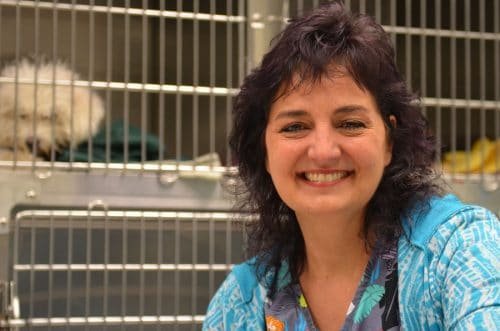 Veterinarian Lisa Woods-Zabari proves time flies by when you love your work. Photo: Lisa Bryan, KP News
Veterinarian Lisa Woods-Zabari proves time flies by when you love your work. Photo: Lisa Bryan, KP News
Dr. Lisa Woods-Zabari has been practicing veterinary medicine on the Key Peninsula for over 30 years. January 2019 will mark the 25th year since she built Brookside Hospital, where thousands of animals have been treated.
“We believe our business will grow based on our heart,” she said. “We have a job to do, but every single one of our staff has real passion for this work.”
Originally from West Virginia, Woods-Zabari graduated at 24 from Ohio State University with a degree in veterinary medicine. While still in school, she worked summers in western Washington for two Ohio State alumni with a vet practice in Shelton. She liked the temperate climate and knew she wanted to settle in the area. After a brief stint in Port Angeles, Woods-Zabari moved south where she began working with Gig Harbor vet Dr. David Kirby—a man she considers a great veterinarian with a philosophy similar to her own and from whom she said she learned much.
Woods-Zabari started Brookside from scratch in 1990 when she was 28, renting the building that currently houses the Key Peninsula Liquor Store on State Route 302. In 1994 she built the hospital around the corner on 118th Avenue NW from the ground up.
Her work with larger animals kept her business afloat while she gradually developed her small animal practice. “Back then we treated horses, cattle, sheep, goats, llamas, alpacas, pot-bellied pigs, domestic pigs, ostriches, chicken, turkeys; you name it,” she said.
“At one point in my life, I was the only ostrich vet in a 100-mile radius; ostriches were very popular in the area for a time.” Woods-Zabari went from the KP to places like Issaquah to treat the giant birds.
By 1997 Brookside Veterinary Hospital was expanding, but as a single mom with a solo practice, being available 24/7 meant taking her young son Tristan with her on farm calls.
“He went everywhere with me. I’d hand him off to my clients, who watched him while I treated their animals,” she said.
As more 24/7 emergency vet clinics opened and another equine vet moved into the area, her practice evolved to focus on small animals.
“I draw the line at reptiles, but we’ve seen just about everything else come through the door,” Woods-Zabari said. While she continues treating goats, it is dogs, cats, rabbits, ferrets and pocket pets such as hamsters and the like that she works with now.
She sees an advantage in Brookside being independent––not owned by a corporation with profit-driven quotas with staff pushing more products and services. Instead, she said, “we get to decide in-house, based on the idea that what works well for one person might not work well for somebody else.”
“For some, an animal is a piece of property that they want to trade-in, like a car for a new model, but for others––that pet feels more like their child,” Woods-Zabari said. “We have to work within the wide range of options between those extremes.”
“Money can be the biggest challenge in veterinarian medicine,” Woods-Zabari said. “Nobody wants to focus on the money because we’re all trying to do the best that we can with what we have. Still we’re all very aware of it and we try to address costs with everyone so that nobody suffers sticker shock, nobody feels guilty, nobody feels condemned.” She tells clients if they fail to take care of themselves first, they’re not going to be around to take care of their pet.
Much of the income that used to help offset the costs of maintaining equipment and facilities has been lost to competition with an ever expanding pet care industry, over the counter medications and online sales, she said. Grant-funded free spay and neuter programs provide helpful options for some people but also cut into a once reliable income stream for vets and the chance to establish a lifelong relationship with preventive medicine for dogs and cats.
“The same business practices used by big pharmaceutical companies that drive up costs for even basic, inexpensive to produce medications for people apply to small animals,” Woods-Zabari said.
Brookside kept a pen out back that had become something of a petting zoo many years ago. “We had some sheep and goats; there was a Canada goose that flew with our goats––I called it ‘my fl-herd,’ ” she said. “It was a long time ago, but some vicious dogs got into the pen and killed our sheep and goats. Only one survived, so I worked with the dangerous dogs laws to get some things changed.” (See “Barnyard Pets, a Heroine and 911” KP News, April 2008.)
“This community rallied around us like you wouldn’t believe,” she said. “This place looked like a funeral parlor with so many flowers and cards of condolences to us as a hospital for losing our pets. It’s just amazing to me how much this community rallies around each other.”
Woods-Zabari said, “People have told me ‘If you picked this place up and set it somewhere else, this and this would happen.’ Nope: This is the heart; this is where we choose to be. I wouldn’t want anything else but to provide what we are giving to this area. We feel blessed to be here and honored to be a part of what this community stands for.”
UNDERWRITTEN BY THE FUND FOR NONPROFIT NEWS (NEWSMATCH) AT THE MIAMI FOUNDATION, THE ANGEL GUILD, ADVERTISERS, DONORS AND PEOPLE WHO SUPPORT INDEPENDENT, NONPROFIT LOCAL NEWS